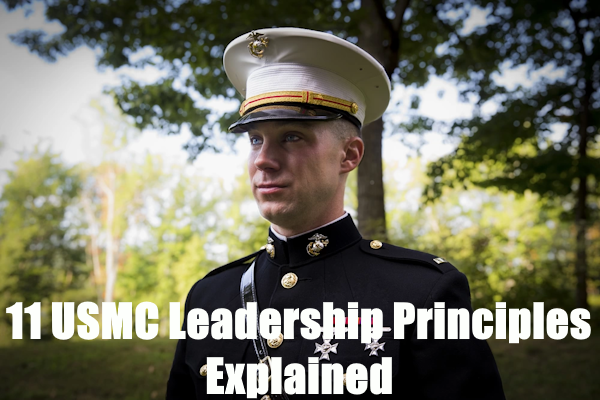Marine Corps (USMC) leadership principles exist for a reason.
The principles and core values of the service branch provide the foundation for becoming a successful Marine.
As such, it’s important to learn and memorize the 11 leadership principles of Marine Corps service.
Discover the 11 USMC Leadership Principles including explanations to understand each core value in greater detail.
Related Article – List Of Marine Corps Bases In The US
Marine Corps (USMC) Leadership Principles & Traits
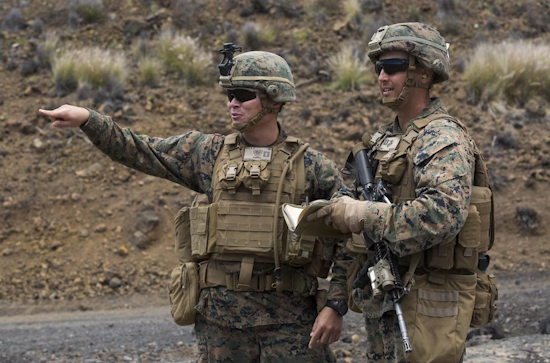
What are United States Marine Corps (USMC) leadership principles and traits?
In general, the service branch has established 11 different sayings, or slogans, for military service.
These USMC leadership principles and core values serve as the basis for military service.
Accordingly, every Marine should learn and understand the significance of each core value.
The U.S. Marine Corps demands the very best in every service member both in terms of performance but also character and reputation.
As a result, honor, courage, and commitment represent the 3 core values of the Marine Corps.
However, there are several other guidelines, or principles, that every Marine should follow on a daily basis.
These include the following 11 USMC leadership principles:
- Know yourself and seek self-improvement.
- Be technically and tactically proficient.
- Know your people and look out for their welfare.
- Keep your personnel informed.
- Set the example.
- Ensure the task is understood, supervised, and accomplished.
- Train your Marines (and Sailors) as a team.
- Make sound and timely decisions.
- Develop a sense of responsibility among your subordinates.
- Employ your command within its capabilities.
- Seek responsibilities and take responsibility.
Marines exist by a set of enduring core values and standards that create the bedrock of personal character.
For this reason, USMC leadership principles and values not only guide actions but also bolster the resolve and resiliency of the service branch.
General C.B. Cates once said:
“Leadership is intangible, hard to measure, and difficult to describe…[it’s] not easily learned. But leaders can be and are made.”
There are many characteristics and personality traits that define a leader in the Marine Corps.
Learn more about each of the 11 leadership principles and core values expected of the service branch:
#1. “Know Yourself and Seek Self-improvement”
There is perhaps nothing more important for a leader than being able to recognize their own strengths and weaknesses.
Leaders must be able to grow, change, and adapt.
Those who are constantly aware of areas of improvement (and working towards those goals) stand to achieve the most in military service.
In general, strong leaders are not only hard-working but flexible and willing to grow and develop.
Consequently, those who understand their strengths and weaknesses can establish areas for improvement.
Those who can identify good and bad qualities, and work to correct and improve the bad qualities go a long way toward personal development.
So, being able to take constructive criticism and respond to requests for improvement will separate you from other Marines.
Often, Marines can learn the most from the success or failures of others.
Therefore, establishing clear goals and consistently working toward those objectives will offer room for improvement.
Related Article – 10 Best Marine Corps Jobs For Civilian Life
#2. “Be Technically and Tactically Proficient”
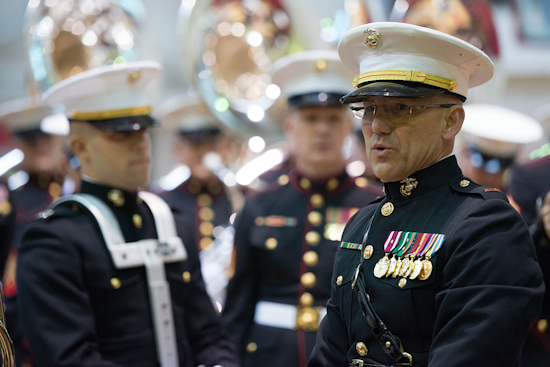
Leaders are not only great with people but also effective at doing their job.
Therefore, the best leaders are also terrific at their craft.
They generally have advanced knowledge and expertise within a specific trade or profession.
Marines must constantly seek to improve their knowledge and job skills.
In general, the Marine Corps does a quality job of offering a diverse range of training programs along with opportunities to return to college.
It’s impossible to transition into a good leader without first knowing how to do your job.
Accordingly, those looking to succeed must seek to learn more than is necessary.
Often, studying and observing other capable leaders helps you also develop your own skills.
Even better, these individuals can offer feedback and other ways to improve upon weaknesses.
#3. “Know Your People and Look Out for Their Welfare”
“Know your people” — or team — is among the most important USMC leadership principles.
The core value focuses on fostering relationships between team members and developing an identity.
There are many in the military who consider their comrades a second family.
As such, Marines get very close to one another and have a strong desire to ensure their welfare.
There is no question that any team cannot succeed with a strong leader who is liked and respected among the group.
Unfortunately, if the team doesn’t listen to its leader, they are not going to be well organized or successful.
Rather, combat teams that work together and develop strong communication are the exact opposite.
They represent some of the finest and most well-organized units in existence.
Consequently, the best Marines put the welfare of others before their own.
They are willing to be injured or perish to protect others and maintain the objective.
Related Article – Marine Infantry MOS Guide
#4. “Keep Your Marine Personnel Informed”
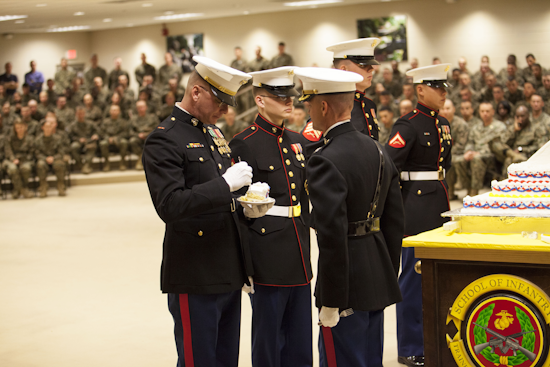
Nobody likes being left in the dark.
Accordingly, a big difference between a team with good leadership and one with poor leadership is the amount of communication.
Therefore, teams that are well-informed and maintain strong communication are much more likely to thrive.
For this reason, it’s impossible to build confidence and trust without first developing strong communication.
Leaders must be effective communicators in a variety of situations, including life and death matters.
Furthermore, they must be able to maintain morale and prevent the spread of rumors or gossip.
Marines who are communicative keep their units informed as much as possible, especially regarding crucial or controversial developments.
They also must be accessible to other Marines who have questions or concerns within the unit.
#5. “Set the Example”
Leaders also lead by example.
In fact, it might be one of the most important (yet subtle) aspects of a good leader.
Marines believe this is also one of the most crucial of the USMC leadership principles to learn.
Leaders who lead by example usually start good habits because they serve as a quality example of how to act and respond.
They may not notice, but people with strong leadership skills usually have others gravitate toward them.
In turn, they also want to resemble the same characteristics that define the individual and what separates them from a crowd.
For this reason, leaders are only as good as the personal example that they set for the rest of the team.
A good leader is also a role model, whereas the opposite is true of a poor leader.
These individuals usually set a poor example, and the rest of the team suffers as a result.
Consequently, make sure that you set a good example during your time in service.
Marines set an example based on their appearance, physical fitness, attitude, hygiene, and many other ways.
You’ll discover that more people are watching than you realize, and it just may lead to an important promotion in military rank.
Related Article – Marine Corps Promotion Timeline For Enlisted & Officers
#6. “Ensure the Task Is Understood, Supervised, and Accomplished”
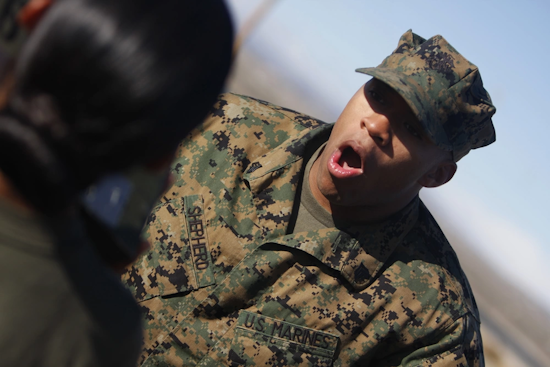
USMC leadership principles like this one actually have 3 different elements:
- Ensure the task is understood;
- Supervised; and
- Accomplished.
Marines encounter many tasks each day that require this 3-step approach.
First, they must ensure that the task is understood.
Communication is a critical skill to acquire and develop during your time in the Marines.
The best leaders are also effective communicators who make sure the objective and purpose are understood.
Secondly, Marines who are leaders must also supervise others and make sure they are doing the job correctly.
Marines who train their team for success will also provide fellow service members with the opportunity for growth and development.
Third, Marines must see an objective through to completion.
The Marine Corps takes this very seriously, which is why supervision and completion are essential qualities of any successful mission.
Marines must understand the various chains of command and how to respond or handle subordinates.
Doing so will ensure the task is understood, supervised, and accomplished.
#7. “Train Your Marines and Sailors As a Team”
There are many opportunities for individual growth and advancement within the Marine Corps.
However, not everything in the military should be about personal achievement, even if it’s crucial in many other ways.
Marines, especially as leaders, must be able to function as a single unit.
Therefore, the better they are at communicating and establishing relationships with team members, the better they will be at their job.
For this reason, Marines spend much of their training finding methods to improve teamwork and organization within a unit.
The crisper and tighter the unit, the more likely the group is to have success as a team.
Teams in the military not only rely on each other for the success of a mission but also for their own personal welfare.
Accordingly, Marines should always train as a team, including during circumstances where fellow sailors join from the U.S. Navy.
Often, teamwork involves finding the strengths and weaknesses of each service member and combining those talents to function as one team.
For this reason, it’s imperative that each member of a team understand their role and purpose within that unit.
Related Article – Marine Corps Height And Weight Standards
#8. “Make Sound and Timely Decisions”
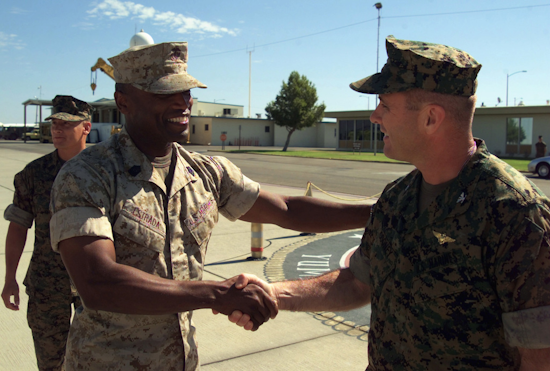
Marines have to make quick and timely decisions.
Often, this is under conflict with a foreign enemy or another high-pressure situation.
Marines must be able to think and make quality decisions under pressure.
Sadly, these decisions (or lack of initiative) can lead to the loss of life or other forms of devastation.
Therefore, Marines as leaders must be able to not only make decisions but live with the consequences.
Marines who understand the core leadership principles and values of the USMC are great improvisers.
They are able to react and respond to unforeseen events and find solutions.
Leaders know that things rarely go to plan, especially in the military where being able to adapt and remain flexible is imperative.
Marines that can estimate a situation, along with the plausible outcomes, and then make a sound decision, make good leaders.
Meanwhile, those who are hesitant or struggle to reach conclusions under pressure may struggle in this type of environment.
So, it’s critical that leaders maintain order, as a loss of confidence is usually devastating to any military unit.
#9. “Develop a Sense of Responsibility Among Your Subordinates”
The military does a fantastic job of developing a sense of responsibility.
Unfortunately, too many things exist in modern society that become excuses for deflecting blame and responsibility.
However, in the Marine Corps, service members are not able to hide behind those same false protections.
Rather, the military is one of the finest places for developing a sense of responsibility and accountability.
As a result, cultivating these qualities remains among the core USMC leadership principles.
Marines must be able to hold others accountable when they fail to live up to the standards of military service.
The same is true when Marines are successful and are worthy of being praised or offered promotions.
Accountability is recognizing the good and bad of a team, along with the numerous ways it can still be improved.
Marines will notice others within a team who are invested and care about their welfare and professional development.
Therefore, leaders who assign tasks and delegate authority also promote confidence and responsibility in fellow service members.
Those who recognize accomplishments while also correcting errors and offering constructive criticism will thrive in the role.
Related Article – US Marine Corps Reserve Pay Chart
#10. “Employ Your Command Within Its Capabilities”
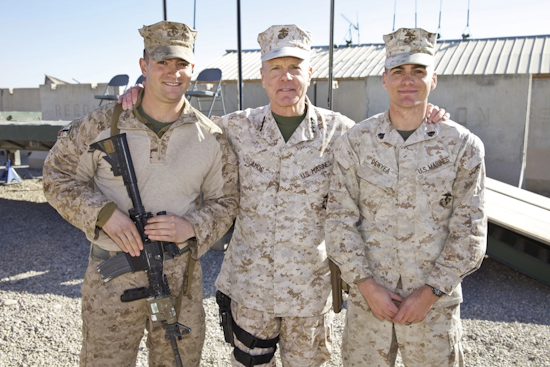
Marines are impressive in many regards, and sometimes it seems like they have no limits.
However, Marines are just like any human in that they have a few flaws or weaknesses.
So, Marines that not only understand their own strengths and weaknesses but those of team members, are in a position for success.
It’s helpful to understand the strengths and weaknesses of team members and how they can enhance or restrict a unit.
Leaders who set their team up for success, and not failure, generally have a strong identity and understand the talents of each team member.
Training provides the time and grace to correct mistakes and take steps to address problems.
Therefore, once the team enters a mission, they’ll perform at the highest capacity possible.
Unfortunately, those who assign Marines outside their capabilities are setting them up for failure.
As a result, leaders must know what they can do to avoid the worst possible outcomes.
Those who avoid favoritism and assign tasks equally among subordinates will also avoid causing divisions within a unit.
#11. “Seek Responsibilities and Take Responsibility”
Again, responsibility and accountability are two of the most fundamental USMC leadership principles.
Leaders lead by example, which means taking responsibility when things do not go as planned.
Furthermore, it can also mean holding others accountable or deflecting praise after a successful mission.
Marines are leaders who not only seek additional responsibilities but take responsibility when they come up short.
This type of accountability is not always common in society but it’s a bedrock of military service.
For this reason, Marines are not afraid to accept daunting challenges or risky assignments.
They are renowned for taking initiative while utilizing sound judgment.
However, when things do not go as planned, it’s not acceptable to whine, complain, or place the blame on others.
In fact, doing so will be an easy way to alienate you from the rest of the team.
Those who seek every opportunity to increase responsibility will get on the radar of higher-ranking officials.
Therefore, it may even lead to an important promotion or new assignment.
Related Article – How To Prepare For Marine Boot Camp
Marine Corps (USMC) Leadership Traits & Principles
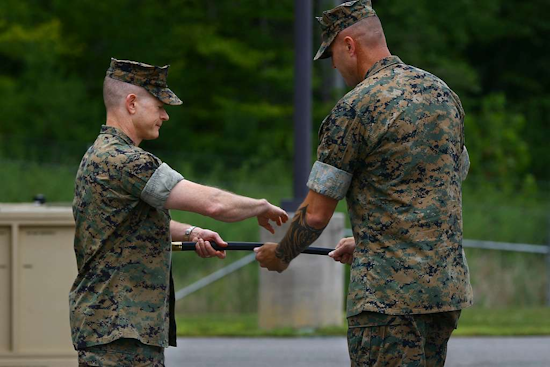
The United States Marine Corps (USMC) leadership principles and core values are faithfully practiced for a reason.
These principles provide the foundation for being a successful leader (“Ductus Exemplo”) in the Marines.
The guidelines establish the inner strength and mental courage to do what is right, even under extreme or life-threatening circumstances.
Furthermore, the USMC leadership principles establish the wisdom and fortitude to make important decisions under intense stress and pressure.
The core values of the Marine Corps are 1) honor, 2) courage, and 3) commitment.
The three building blocks of military service are designed to enable Marines to make the right decisions at the right time.
Honor guides Marines to represent the best in moral and ethical behavior.
Marines never lie, cheat, or steal and abide by the uncompromising code of integrity, including respecting others.
Secondly, courage grants Marines the physical, mental, and moral strength to overcome fear and insurmountable odds.
It also enables the desire to do what is right by acting responsibly and maintaining accountability.
Lastly, the spirit of determination and dedication common in Marines is defined as “commitment.”
Commitment means leading by example and maintaining discipline, including putting others before yourself.
USMC Leadership Traits
The U.S. Marine Corps distinguishes the following 14 traits as important to becoming a leader in the service branch.
The 14 leadership traits and leadership principles of the USMC include:
- Justice
- Judgment
- Dependability
- Initiative
- Decisiveness
- Tact
- Integrity
- Enthusiasm
- Bearing
- Unselfishness
- Courage
- Knowledge
- Loyalty
- Endurance
Marines operate by the motto “Semper Fidelis” which means “always faithful.”
Semper Fidelis symbolizes the lifelong commitment every Marine values and incorporates the 11 USMC principles into its existence.
Related Article – Marine Corps Age Limits
Conclusion
Marine Corps (USMC) leadership principles and core values are part of the foundation of military service.
These core values and principles represent what it means to serve the nation as a Marine.
For this reason, Marines should take the time to learn and constantly develop the 11 leadership principles of service.
USMC principles define what it takes to become an effective leader in the Marine Corps.
Featured Image Source – www.DvidsHub.net
- Ikon Pass Military Discount: Learn How To Save Big - January 31, 2025
- RTIC Military Discount: Find Out How To Save Big on Gear - January 30, 2025
- Traeger Military Discount: Learn How To Save Big on Smokers - January 28, 2025

